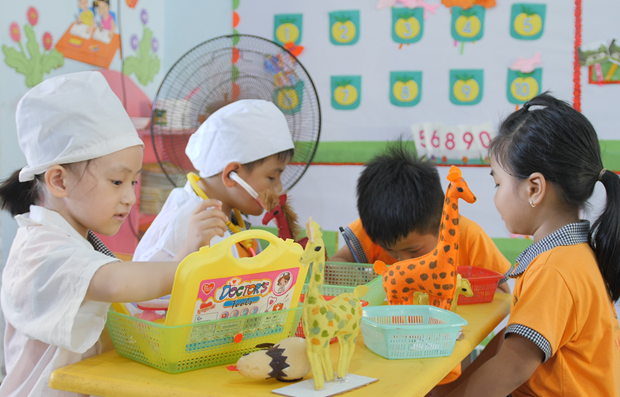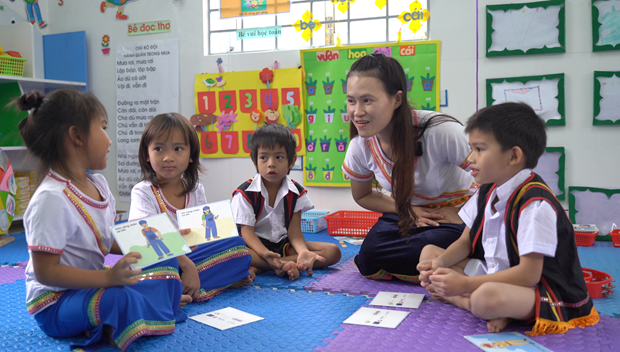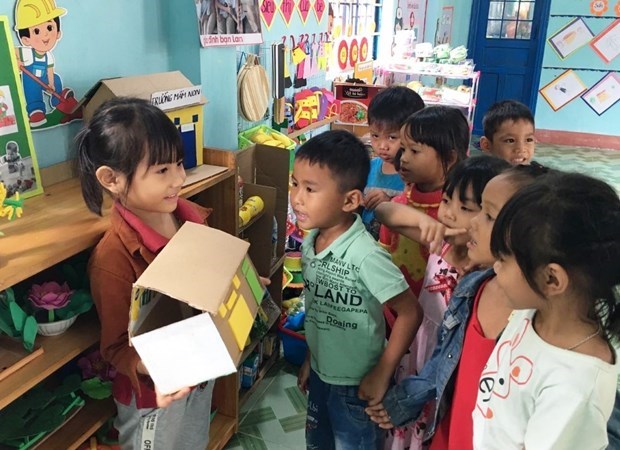Gender-responsive teaching and learning in the early years yield positive outcomes
 Students participate in project-based learning. (Photo: Vietnam+)
Students participate in project-based learning. (Photo: Vietnam+)This information was shared by experts at an online workshop on the “Gender-responsive Teaching and Learning in the Early Years” (GENTLE) project, held on May 6 by the Flemish Association for Development Cooperation and Technical Assistance (VVOB) and the Research Centre for Gender, Family and Environment in Development (CGFED).
Young children in Vietnam are exposed to gender roles and expectations. This early gender socialisation is reinforced in pre-school environments (for e.g., through gender-specific toys and gender-based activities). Particularly in the central provinces, inequalities due to early gender socialisation are among the most persisting equity issues, affecting both girls and boys.
Children start forming their gender identities at the age of four. Addressing children’s experiences in their early years through gender-responsive play-based learning is crucial to influence their long term cognitive and social-emotional development and to work on the prevention and elimination of gender inequality; a precursor to gender-based violence.
The GENTLE project transforms pre-schools in 15 districts in Quang Nam and Quang Ngai provinces into environments of gender-responsive play-based learning, involving parents (and fathers in particular) to the fullest in the process.
Implemented from 2018 to 2021, the project centres on developing the capacity of pre-school teachers and school leaders to challenge social and gender norms, create new rules, and support children in adopting new, more equitable attitudes and behaviours. They are provided with tools to effectively implement gender-responsive play-based learning at school and to advocate for this approach at home too with the parents of their young learners.
After three years of implementation, the GENTLE project has achieved many positive results. There has been a significant change in the attitudes of parents in gender-responsive educational practices and gender equality. Specifically, male parents pay more attention to taking care of their children, respect the preferences of both boys and girls, and share housework with family members. Children also feel happier when they receive the attention and care of both parents in learning and playing. They are also more confident in communicating with their classmates, express their own interests, and excitedly participate in all activities suggested by the teacher.
With the initial positive results, the project has created a favourable environment spread by local departments to 153 kindergartens in 15 districts in Quang Nam and Quang Ngai. Some 1,831 staff and teachers have strengthened their capacity through GENTLE’s training activities, while more than 32,229 children are learning in a gender-responsive play-based environment. The gender-responsive learning method has also been replicated in Kon Tum province with funding from Belgium.
 Adjustments to teaching methods to avoid gender stereotypes have been applied. (Photo: Vietnam+)
Adjustments to teaching methods to avoid gender stereotypes have been applied. (Photo: Vietnam+)Gender-responsive play-based learning implemented at pre-school and at home contributes to the development of positive identities, relationships, and self-esteem in 3-5-year-old children.
Gender inequality is a global and complex issue. Research shows that children adopt gender stereotypes very early on in life. Gender stereotypes reinforce the idea of unbalanced relations between men and women. Therefore, early-childhood education has an important role to play to ensure girls and boys receive the same opportunities to develop their talents and interests.
 Over 32,000 pre-school children have benefited from the project. (Photo: Vietnam+)
Over 32,000 pre-school children have benefited from the project. (Photo: Vietnam+)VVOB is a Belgian non-profit organisation focusing on Education for Development. It started working in Vietnam in 1992. Since 2008, it has focused on the education sector and on early childhood education since 2014.
Founded in 1993 as one of the first Vietnamese non-government organisations (NGOs), the CGFED has been carrying out social scientific research and intervention activities targeting women’s development and gender equality./.












